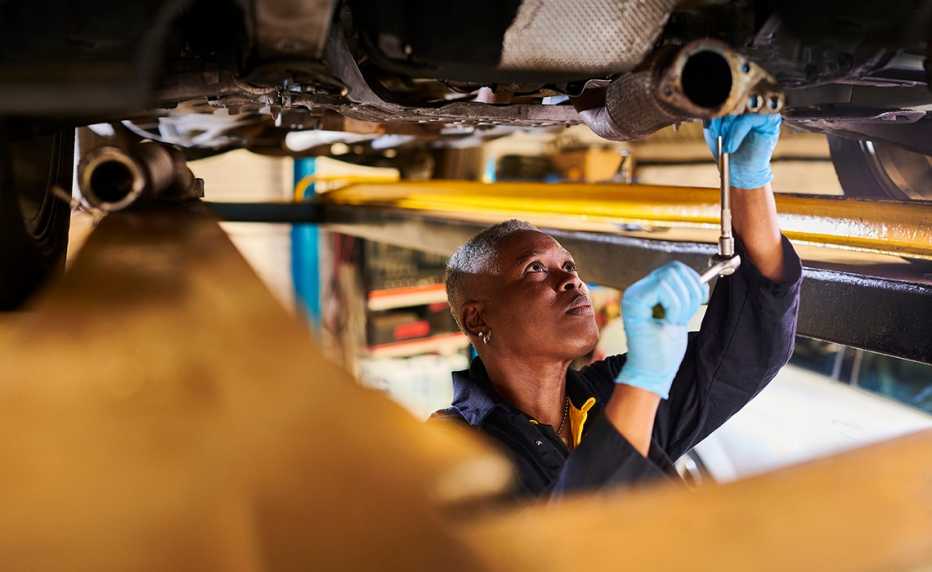Do you know that 85% of Americans confess to having difficulty finding a trustable mechanic? This statistic highlights a prevalent issue many vehicle owners face, underlining the importance of selecting the right professional for the job. Envision the peace of mind you will have knowing your car is in capable hands.
When searching for the best auto mechanic near you, consider the mechanics’ certifications and experience. ASE (Automotive Service Excellence) certification is a good indicator of skill and reliability. Additionally, online reviews and testimonials can provide insights into the level of service you can expect, ensuring your vehicle receives top-notch care.

How to Choose the Best Auto Mechanic Near Me
Finding the best auto mechanic near you starts with gathering recommendations from trusted sources. Friends, family, and coworkers can provide honest feedback on local mechanics they’ve used. Additionally, check online review sites for ratings and testimonials from other customers. These reviews can give insights into the mechanic’s quality of work and customer service. Recommendations and reviews help create a shortlist of potential mechanics.
Certification and experience are essential factors. Look for mechanics with ASE (Automotive Service Excellence) certification. This certification shows they have the necessary skills and knowledge. Experience also matters; a mechanic with years in the business will likely handle various car problems effectively. These qualifications ensure your car is serviced by skilled professionals.
Pricing and service guarantees can influence your decision. Get quotes from multiple mechanics to compare their prices. Some shops offer warranties or guarantees on their work, which can provide peace of mind. Ask about these guarantees and what they cover. Comparing prices and guarantees helps you find a good balance between cost and quality.
Visit the shop for an initial evaluation before committing. Take note of the cleanliness and organization of the shop. Speak with the mechanic and ask questions about your car’s needs. This interaction can give you a sense of their professionalism and expertise. A well-organized shop and a knowledgeable mechanic indicate a reliable choice.
Step 1: Gather Recommendations from Trusted Sources
Start by asking friends, family, and neighbors about their experiences with local auto mechanics. Personal recommendations from people you trust can be incredibly valuable. They can provide insights based on firsthand experience. Often, these sources will share details about the mechanic’s reliability and quality of service. This process helps narrow down your options to a few trusted candidates.
Online review sites such as Yelp and Google Reviews offer a wealth of information. Look for mechanics with consistently high ratings and numerous positive reviews. Detailed feedback from other customers can highlight strengths and weaknesses. Pay attention to recurring themes in the reviews. These can give you a well-rounded view of the mechanic’s performance.
Local community forums and social media groups can also be helpful. Many neighborhoods have Facebook groups where residents share recommendations and advice. These platforms allow you to ask questions and get multiple opinions quickly. They can also help you find mechanics who might not be widely advertised. Engaging with community members adds another layer of trust to your search.
Consider checking with professional organizations like the Better Business Bureau (BBB). The BBB provides ratings and accreditation for businesses, including auto repair shops. A high BBB rating indicates a shop with a good track record. This step can further verify the credibility of the mechanics you’re considering. Using multiple sources for recommendations ensures a well-informed decision.
Step 2: Check for Certifications and Memberships
Certifications are crucial indicators of a mechanic’s expertise and training. One of the most respected certifications in the industry is the ASE (Automotive Service Excellence) certification. Mechanics with ASE certification have passed rigorous exams and demonstrated hands-on experience. This certification ensures they are knowledgeable and competent in various areas of auto repair. It’s a good sign that the mechanic is committed to maintaining high standards.
Memberships in professional organizations also add to a mechanic’s credibility. Many mechanics belong to groups such as the Automotive Service Association (ASA) or the National Institute for Automotive Service Excellence. These memberships often require adherence to codes of ethics and continuous education. Being part of these organizations shows a commitment to professional growth and ethical practices. It can give you additional peace of mind.
When visiting a repair shop, don’t hesitate to ask about certifications and memberships. Mechanics usually display their certifications in the shop or office. Seeing these credentials can boost your confidence in their abilities. If they are not visible, ask the staff to show them. A reputable mechanic will be proud to share their qualifications.
Comparing certifications and memberships among different mechanics can help in your decision. It’s worth making a list of potential mechanics and noting their credentials. This way, you can easily compare and choose the most qualified professional for your car. Checking for these certifications and memberships is a vital step in ensuring quality service.
Step 3: Verify Reputation Through Reviews and Testimonials
Online reviews and testimonials are powerful tools for assessing a mechanic’s reputation. Websites like Yelp, Google Reviews, and Angie’s List provide ratings and customer feedback. These platforms offer detailed insights into the experiences of other customers. Look for consistently high ratings and positive comments. Be cautious of mechanics with numerous negative reviews.
- Yelp
- Google Reviews
- Angie’s List
Reading both positive and negative reviews gives a balanced view. While positive reviews highlight strengths, negative reviews pinpoint potential issues. It’s essential to see how the mechanic responds to criticism. A professional and courteous response to a complaint indicates good customer service. This ability to handle feedback can influence your choice significantly.
Checking for reviews on multiple platforms broadens your understanding. Different sites may show varying perspectives or additional information. Sometimes, a mechanic might have a better reputation on one site than another. Combining reviews from several sources provides a fuller picture. This comprehensive approach ensures you’re making an informed decision.
Testimonials on the mechanic’s website can also be useful. While they are likely to highlight positive experiences, they can still provide valuable insights. Look for detailed testimonials that discuss specific services and outcomes. This can give you a sense of the mechanic’s expertise and customer satisfaction. However, balance these with reviews from third-party sites.
Seek recommendations from social media and local forums. Platforms like Facebook and Nextdoor can be great places to ask for advice. Community members often share honest opinions and personal experiences. Engage in conversations to gather more detailed feedback. This local insight can be instrumental in choosing the best mechanic.
Step 4: Compare Pricing and Service Guarantees
Comparing pricing among different mechanics is essential to avoid overpaying. Get quotes from several shops for the same service to gauge the market rate. Ensure that the quotes include a detailed breakdown of costs. This will help you understand what you’re paying for and any additional fees. Comparing prices helps identify reasonable rates for quality work.
Service guarantees and warranties offer peace of mind that the work will be done correctly. Ask each mechanic about their guarantees on parts and labor. Typically, reputable mechanics offer warranties that cover a certain period or mileage. These can vary significantly between shops, so it’s worth comparing. A good warranty indicates the mechanic’s confidence in their workmanship.
Some mechanics offer price matching or additional perks. For instance, free inspections or car washes can be part of their service package. These extras can add value and make one mechanic more appealing than another. Always ask about any additional services included in the price. It might tip the scale in favor of one shop over another.
Don’t forget to read the fine print on service guarantees. Some warranties cover only specific parts or types of repairs. Understanding the terms can prevent misunderstandings later. Get everything in writing to ensure clarity. Clear terms help solidify trust in the mechanic’s reliability.
Use tables to compare the quotes and guarantees side by side for better clarity:
| Mechanic | Price Quote | Warranty | Additional Services |
|---|---|---|---|
| Mechanic A | $200 | 1 year/12,000 miles | Free car wash |
| Mechanic B | $250 | 2 years/24,000 miles | Price matching |
| Mechanic C | $220 | 6 months/6,000 miles | Free inspection |
This comparison table helps you evaluate which mechanic offers the best overall value. It’s a straightforward way to visualize differences and make an informed decision. Combining price, warranty, and extra services ensures you select the best option.
Step 5: Visit the Shop for an Initial Evaluation
Visiting the shop in person provides an opportunity to evaluate the facility. Observe the cleanliness and organization of the workspace. A tidy shop usually indicates professionalism and attention to detail. Take note of the equipment and tools they use. Modern, well-maintained equipment is a positive sign.
Speaking with the mechanic directly can give you a better sense of their expertise. Ask questions about your car’s needed repairs and gauge their responses. A good mechanic will explain things clearly and patiently. This interaction helps build trust and confidence. It’s important to feel comfortable with their communication style.
During your visit, pay attention to the staff’s overall demeanor. Friendly, respectful employees reflect a positive work environment. They should be willing to answer your questions and provide information. A helpful and courteous staff suggests good customer service. This is a valuable aspect of any business.
- Cleanliness of the shop
- Mechanic’s communication style
- Staff demeanor
Watch how they handle other customers while you’re there. This can give you insights into their customer service practices. Do they seem rushed or attentive? Their behavior with other clients can hint at how they’ll treat you. Observing these interactions can help in your overall assessment.
Consider getting a small service or inspection during your visit. This allows you to experience their service firsthand without a significant commitment. It can be a simple oil change or a tire rotation. This test service can reveal their efficiency and professionalism. Making an initial visit is a practical step in your decision-making process.
Evaluating the Credentials of Auto Mechanics
Credentials play a crucial role in determining the quality of an auto mechanic. ASE (Automotive Service Excellence) certification is one of the most recognized qualifications. It indicates that a mechanic has passed rigorous exams and meets industry standards. This certification assures competence, reliability, and professionalism. Always look for this credential when evaluating mechanics.
In addition to ASE certification, memberships in professional organizations are important. Mechanics who belong to groups like the Automotive Service Association (ASA) typically follow strict ethical guidelines. These memberships often require ongoing education to keep up with industry changes. Being part of such organizations shows a commitment to continuous improvement. It adds another layer of credibility.
| Certification | Description |
|---|---|
| ASE Certification | A national standard for automotive repair professionals. |
| ASA Membership | An association that promotes ethics and excellence in auto services. |
Training background can also be a key indicator. Many mechanics have attended technical schools or completed apprenticeships. These programs provide hands-on experience and theoretical knowledge. Ask about their training history to get a sense of their expertise. Well-trained mechanics are better equipped to diagnose and fix issues accurately.
Experience complements formal qualifications effectively. Mechanics with years or even decades in the business accumulate valuable skills through real-world practice. Experience often translates into quicker, more accurate repairs due to familiarity with various problems and solutions. Verify how long they have been practicing their trade. Combining experience with credentials ensures top-notch service.
Lastly, check if the mechanic has manufacturer-specific certifications if you drive a particular brand of car. For example, some mechanics may be certified by brands like Ford or Honda for brand-specific expertise. These credentials show specialized training from the manufacturers themselves, ensuring your vehicle gets appropriate care. Evaluating these credentials provides confidence in their ability to handle your car efficiently.
Understanding the Importance of Experience in Auto Repair
Experience in auto repair is a key factor to consider when choosing a mechanic. A mechanic with many years in the field has encountered a wide range of issues. They develop problem-solving skills that only come with hands-on practice. This experience often leads to quicker diagnostics and repairs. Relying on an experienced mechanic can save you both time and money.
Veteran mechanics bring a wealth of knowledge to every job. They have seen various makes and models and understand their unique quirks. Years of working on different vehicles allow them to spot problems that less experienced mechanics might miss. This depth of knowledge can enhance the quality of repairs. It ensures your vehicle receives the best possible care.
Confidence and competence are hallmarks of experienced mechanics. Having handled countless repairs, they are less likely to be stumped by unusual issues. This confidence translates into professionalism and efficiency. You can trust them to handle complex repairs without hesitation. Their competence ensures reliable and effective solutions.
Experience also provides mechanics with valuable customer service skills. Over time, they’ve learned how to communicate effectively with car owners. They can explain issues clearly and suggest the best solutions. A mechanic who excels in customer service makes the entire repair process smoother. Excellent communication builds trust and satisfaction.
- Quick diagnostics
- In-depth knowledge
- Problem-solving skills
- Effective communication
An experienced mechanic is often more adept at using diagnostic tools and technology. They keep up with advancements and integrate new methods into their practice. This combination of experience and modern techniques ensures accurate assessments. Updated knowledge paired with practical experience makes for a well-rounded professional. Choosing an experienced mechanic is a smart move for any car owner.
Identifying Signs of a Reliable Auto Mechanic
One of the primary signs of a reliable auto mechanic is transparency. A trustworthy mechanic will provide clear estimates for repairs and explain the work needed. They won’t try to upsell unnecessary services. This honesty helps build a good customer relationship. Transparency ensures you know what you’re paying for.
Punctuality and organization are also key indicators. Reliable mechanics stick to their estimated repair timelines and keep their workspace orderly. An organized shop usually reflects the mechanic’s attention to detail. It indicates they manage their tasks efficiently. Timeliness and orderliness contribute to a smoother experience for the customer.
Professional certifications and continued education show dedication to the craft. Mechanics who pursue further training and certifications demonstrate their commitment to quality. They stay updated with the latest automotive technology and repair techniques. This ongoing education benefits you as a customer because it ensures high-quality service. It shows that the mechanic is serious about their profession.
- Transparent estimates and communication
- Punctuality in repairs
- Professional certifications
- Clean and organized workspace
Customer reviews and testimonials are invaluable resources. Positive feedback from other clients indicates a reliable and trustworthy mechanic. Consistently good reviews suggest that the mechanic provides satisfactory service. Pay attention to specific mentions of punctuality, honesty, and quality work. These reviews can guide you in making an informed choice.
Another sign is how the mechanic interacts with you during your first visit. Are they attentive and willing to answer questions? Do they provide clear explanations without jargon? Such behavior reflects respect and professionalism. Good communication is crucial for trust and reliability in any service industry.
What to Do If You Have a Bad Experience
If you encounter a bad experience with an auto mechanic, the first step is to communicate your concerns directly to them. Often, a sincere conversation can resolve misunderstandings or mistakes. Politely explain the issue and see if they are willing to make things right. Most reputable mechanics want to maintain a good reputation and will attempt to correct errors. Clear communication is key.
If the mechanic is unresponsive or unwilling to help, consider escalating the matter. Contact the shop’s manager or owner if you haven’t already. Document your experience, including dates, payments, and any related communication. This documentation will be helpful if you need to take further action. Keeping records ensures you have evidence to support your claims.
In cases where the issue remains unresolved, you can file a complaint with relevant consumer protection organizations. The Better Business Bureau (BBB) is a good place to start. They can mediate disputes and provide resolution options. Additionally, you might consider contacting state and local consumer protection agencies. These organizations can offer legal advice and assistance.
Sharing your experience through online reviews is another option. Writing a detailed and honest review on platforms like Yelp or Google Reviews helps future customers. It can also pressure the mechanic to address the issue if they value their public image. When writing your review, stick to facts and remain respectful. This approach maintains your credibility.
- Communicate concerns directly
- Escalate to shop manager or owner
- Document your experience
- File complaints with consumer protection organizations
- Write a detailed online review
If all else fails, consider seeking legal action for compensation. Small claims court is an option for disputes involving smaller amounts of money. Research your rights as a consumer and prepare your case with all the necessary documentation. While legal action is a last resort, it can sometimes be necessary. This step ensures you get fair treatment and compensation.

Conclusion
Choosing the best auto mechanic near you involves careful consideration of various factors. From gathering recommendations to verifying certifications, each step plays a crucial role. Understanding the importance of experience and evaluating the mechanic’s credentials ensures high-quality service. Trust and reliability are built through transparency and professionalism.
Following these guidelines can help you make an informed decision. If issues arise, addressing them promptly and professionally is key. Your efforts in selecting the right mechanic will lead to better car care and peace of mind. A reliable mechanic is an invaluable partner in maintaining your vehicle’s health.




Leave a Reply